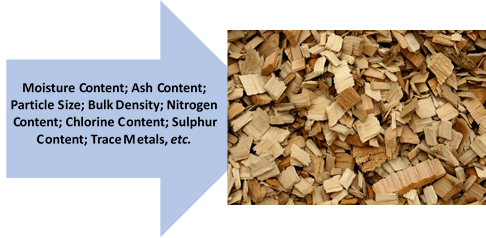Wood Chips are small to medium sized pieces of wood formed by cutting or chipping larger pieces of wood such as trees, branches, logging residues, stumps, roots, and wood waste. As one of the most important solid biomass resource, there has been increasing demand for wood chips in the market of bio-fuel energy. Due to the widespread trade of wood chips worldwide, it is crucial to characterize the quality of wood chip products in order to meet international standards.
Lifeasible is a global leader in testing and inspection of wood chips as biomass fuel. We have developed a professional wood chips biomass fuel testing laboratory to provide robust services for the determination of physical and chemical properties (moisture content, ash content, particle size, bulk density, nitrogen content, chlorine content, sulphur content, trace metals, etc.)
 Figure 1. Quality testing of wood chips biomass fuel
Figure 1. Quality testing of wood chips biomass fuel
For wood chips, the most important evaluations are based on moisture content, ash content, and size. The moisture content of wood chips can affect the selection of boilers in which the chips can be used. The larger boilers could use wood chips with higher moisture content compared to the small boilers. Moreover, unlike small boilers, the larger boilers are usually equipped with automatic de-ashing devices and thus could tolerate wood chips with higher ash content. The typical size of wood chips in trade market is 5 to 100 mm. Oversized pieces of wood chips can easily get stuck in the auger, which prevents the auger from feeding bioenergy fuel to the boiler. In addition, extra-long, thin pieces of wood chips can also block the entrance of the boiler. Thus, it is important that wood chips should be with even size distributions.
According to the moisture content, ash content, and source origins, wood chips can be classified into four grades: class A1, class A2, class B1, and class B2. Classes A1 and A2 are virgin wood and chemically untreated wood residues with lower moisture and ash contents. Wood chips of class B1 may contain other materials, such as short rotation coppice, wood from gardens and plantations, and chemically untreated industrial by-products and resides. Wood chips of class B2 may contain chemically treated industrial by-products and residues and used wood, but without harmful chemicals or heavy metals.
With world-class technical expertise and experience in biomass fuel science, Lifeasible provides you with high-quality wood chips biomass fuel testing services. We can help you develop wood chips biomass fuel products which comply with national and international regulations. For more information, please feel free to Contact Us.